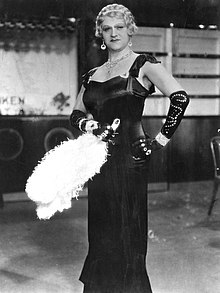|
Neighbors (1937 film)
Neighbors[1] (Polish: Piętro wyżej) is a 1937 Polish musical romantic comedy film directed by Leon Trystan, and starring Eugeniusz Bodo, Józef Orwid and Helena Grossówna. Its plot follows two neighbors who, although unrelated, happen to have the same last name (Henryk and Hipolit Pączek) and are complete opposites of each other. Complications arise when the niece of the older, Hipolit Pompek arrives for a visit and gets into Henryk's apartment who immediately falls for her. The film was awarded the main prize at the Polish Film Festival in Lviv in 1938. In September Piętro wyżej was dubbed into Yiddish and released in December of that year under the title Shkheynim in New York.[2] Famous Polish-Jewish actor Menasze Oppenheim starred in the lead role.[1] Neighbors is one of the most popular Polish pre-war films. Heavily inspired by pre-Code motion pictures, the film is noted for the first ever on-screen depiction of a drag queen in Polish cinema.[3] SynopsisThe film tells the story of two neighbors in a tenement house at 13 Szczęśliwa Street: the older Hipolit Pączek (who lives below) and the younger Henryk Pączek (a tenant living one floor above). Apart from their last names, they have almost nothing in common. The former is a classical music lover, while the latter is a well-known radio announcer and jazzman. They wage constant war with each other, as the owner of the tenement cannot remove the troublesome tenant. The situation is further complicated by the arrival of Hipolit's young relative named Lodzia, with whom (with reciprocity) Henryk falls in love. In addition to situational comedy and witty dialogues, the success of the film was also ensured by songs performed by Eugeniusz Bodo, that all turned out to be hits. Cast
Production Neighbors was produced by the studio Urania-Film under the direction of Witold Dybowski. The direction of the film was assigned to Leon Trystan, while the script for it was written by Emanuel Schlechter, Ludwik Starski and the film's star – Eugeniusz Bodo. The latter also took artistic direction of the film. Seweryn Steinwurzel was responsible for the film's cinematography.[3] MusicThe score for the film and its songs were composed by Henryk Wars, with Schlechter writing the words.[4] Three songs appeared in Neighbors in total:
ReceptionIn the trade weekly illustrated magazine Kino, there was a positive review of Neighbors: "...at last a very good Polish film comedy (...) a step up in film development".[5] A review in Nasz Przegląd praised the comedy for the fact that "the humor derived from moral motifs transforms with the development of the plot into comedy reminiscent of the Marx Brothers' [Marx] surrealist humor".[6] On the other hand, Neighbors was heavily criticized in right-wing circles. Mieczyslaw Hoszowski wrote the following about the film:
Also, the reviewer of the right-wing Prosto z mostu A. Mikulowski expressed disapproval of the Mae West parody scene: when "Bodo appears dressed as a woman, arousing the enthusiasm of the less picky audience, then the hands folded in applause fall down".[7] An anonymous review in Gazeta Polska stated: "The film as a whole is banal. The interiors are thoroughly unsightly. [...]. The unfortunate idea with a radio speaker dressed as Mae West sinks seriously into vulgarity".[8] Years later, Neighbors was reviewed favorably. Paula Apanowicz of the Oldcamera.pl portal stated that Trystan's film was "a journey into a distant era - an encounter with a laughing interwar, feeling on the back of one's neck the cool breath of the catastrophe that was about to happen in a moment".[9] Lukasz Budnik of Film.org.pl emphasized that Neighbors is "one of the most valuable films of that time [the interwar period], considered by many today to be the best"[10] References
Notes
Bibliography
Information related to Neighbors (1937 film) |
||||||||||||||||||||||||||
